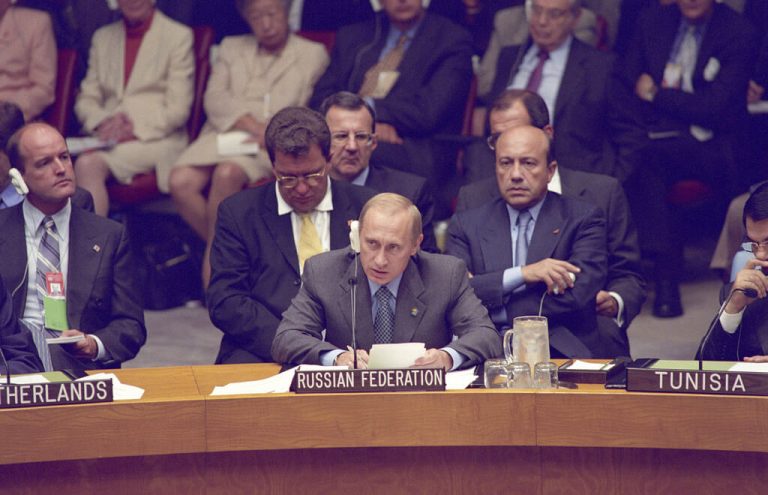
Ortega Grants Chinese Company a Huge Mining Concession

PUBLICIDAD 1M
PUBLICIDAD 4D
PUBLICIDAD 5D
As the 2018 presidential election approaches, Putin’s façade as the strongman-reformer that Russia needs remains intact

United Nations | Flickr.com | Creative Commons
Moscow – Last November, when the performance artist Pyotr Pavlensky set fire to the central door of Moscow’s Lubyanka – the headquarters of the Russian Federal Security Service (FSB) and formerly of the Soviet Union’s security service, the KGB – the state accused him of destroying its “cultural heritage.” Apparently, the brutal interrogation of world-renowned artists, from the poet Osip Mandelstam to the theater director Vsevolod Meyerhold, amounts to a patrimony worthy of the state’s strongest protection.
Of course, the reality is that the Lubyanka has been an instrument of the destruction of Russia’s cultural heritage. But, under President Vladimir Putin – himself an alumnus of the KGB – Russia’s government is not interested in reality. It prefers Orwellian doublespeak, which, attesting to the regime’s propaganda skills, is more perverse even than that practiced in Soviet times – and produces a terrifying doublethink among Russia’s citizens.
Under Joseph Stalin, genuine achievements – including industrialization and victory in World War II – were played up in the ideological battle against capitalism, even as Mandelstam, Meyerhold, and millions of others perished at the hands of the secret police. But Putin lacks any such victories. The hollow victory that was the annexation of Crimea, while popular, pales in comparison to his predecessors’ greatest feats, so he has been forced to move beyond distraction to blatant distortion, claiming that the West is deliberately impeding Russia’s success.
Putin’s success in convincing the Russian public of everything from his own aptitude for ice hockey to the existence of anti-Russian Western plots reflects his real talent: like any good KGB operative, he is a master of façades. Most obvious, because the Kremlin controls all major news sources, Russians hear the version of events – whether the revolution in Ukraine, opposition protests in Moscow, or the military campaign in Syria – that Putin wants them to hear.
Even moves that seem to run counter to Putin’s objectives – namely, leaving the Internet essentially free – are spun to his advantage. Using his characteristic doublespeak, Putin has managed largely to offset the criticism and debate that Russians find online by citing it as evidence that he is a reformer.
Putin’s most recent move to reinforce his pro-reform façade has been to bring back to the Kremlin Alexei Kudrin, a former finance minister known for his liberal views, support for modernization, and occasional criticism of the president. Placing Kudrin in charge of Russia’s Center for Strategic Research advances Putin’s claim that he is prepared to lead the economic modernization effort that Russia so badly needs. Of course, it is Putin’s government that, with the help of the military-industrial complex, has been suffocating Russia’s economy.
Given such a glaring contradiction, one might wonder why Putin’s façade of enlightened and effective leadership doesn’t crumble. The explanation can be found in a billboard on the Rublevsky highway leading to Putin’s country residence, which reads, “Russia is a force for peace, the last hope of God on Earth.” Paid for by a private firm to please the Kremlin, the billboard highlights Putin’s alliance with the ultra-conservative Russian Orthodox Church, enabling him to fuse religious faith, patriotism, and blind trust in the state. This, together with private companies’ eagerness to curry favor, forms the foundation of Putin’s leadership.
Putin is now trying to use the same tactics with the rest of the world. Kudrin’s return has more to do with convincing the West to lift the sanctions imposed on Russia following the annexation of Crimea than with shoring up support among the Russian public, the vast majority of which continues to approve of Putin’s government.
Western leaders – starting with those in Europe who are already beginning to soften on sanctions – must recognize that Kudrin’s return is intended only to preserve the Kremlin status quo. Kudrin is a prop, whose role is to reinforce Putin’s image as a “strongman-reformer.” He is the “good cop” to Putin’s “bad cop,” aimed at persuading the West that Russia can be trusted, even as it demands respect. The West must not allow itself to fall for this tired routine.
Within Russia, breaking down Putin’s façade will be more difficult. To be sure, the reality of life there today is stark. Beyond the tanking economy, Putin’s critics have been subject to arrest, imprisonment, and, in the cases of the journalist Anna Politkovskaya and the politician Boris Nemtsov, murder. Then there are the increasingly frequent attacks on ordinary citizens – home break-ins, property damage, and even prison terms – for publishing anti-Putin, anti-Kremlin, or anti-church caricatures and blogs.
But, in a truly masterful KGB-style move, Putin outsources both the repression and the liberalism, thereby remaining above the fray. The former is handled by the Russian equivalent of Chairman Mao’s Hong Weibings, the ideological volunteers who, in the 1960s, carried out sanctioned attacks on freethinking teachers, scientists, artists, and students. The latter is where the likes of Kudrin come in. In the end, nothing changes; as the 2018 presidential election approaches, Putin’s façade as the strongman-reformer that Russia needs remains intact.
Nina L. Khrushcheva is Professor of International Affairs and Associate Dean for Academic Affairs at The New School and a senior fellow at the World Policy Institute.
Copyright: Project Syndicate, 2016.
www.project-syndicate.org
PUBLICIDAD 3M
PUBLICIDAD 3D